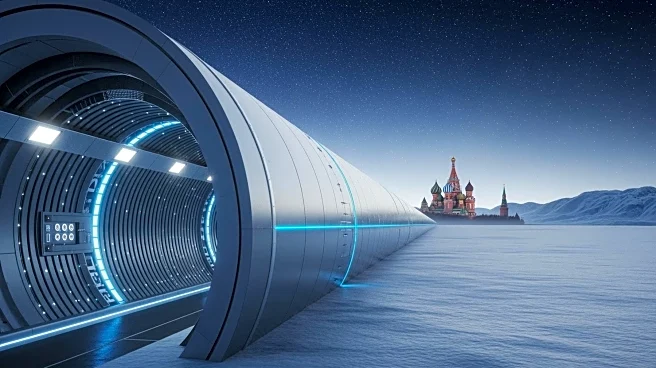What's Happening?
The Kremlin has proposed an ambitious infrastructure project to President Trump and Elon Musk, involving the construction of an undersea rail tunnel connecting Russia and Alaska through the Bering Strait.
This proposal was presented by Kirill Dmitriev, an investment envoy for Russian President Vladimir Putin, on Musk's social media platform X. Dmitriev suggested that the project, which would symbolize unity, could be partially funded by Moscow. The estimated cost of the tunnel is $65 billion, but Dmitriev claims that with The Boring Company's technology, the cost could be reduced to $8 billion, with completion possible within eight years. President Trump expressed interest in the proposal, stating it was 'interesting' and that he would consider it. However, Ukrainian President Volodymyr Zelenskyy expressed dissatisfaction with the idea.
Why It's Important?
The proposed tunnel could have significant geopolitical and economic implications. If realized, it would create a direct link between Russia and the United States, potentially facilitating trade and travel. This could alter the dynamics of U.S.-Russia relations, which have been strained in recent years. Economically, the project could provide substantial business opportunities for The Boring Company and other involved parties, potentially reducing construction costs and timelines. However, the proposal also raises concerns about the political motivations behind such a project, especially given the current international sanctions on Russia and the ongoing conflict in Ukraine. The reaction from Ukrainian President Zelenskyy highlights the potential for increased tensions in Eastern Europe.
What's Next?
The next steps involve further discussions and evaluations of the feasibility and implications of the tunnel project. Key stakeholders, including U.S. government officials, The Boring Company, and international bodies, will likely assess the project's potential benefits and risks. Political leaders in the U.S. and Russia may engage in diplomatic talks to explore the project's viability and address any geopolitical concerns. Additionally, environmental and regulatory assessments will be crucial in determining the project's impact and compliance with international standards.
Beyond the Headlines
The proposal for a Russia-Alaska tunnel raises questions about the long-term strategic goals of Russia and its relationship with the U.S. The project could be seen as an attempt by Russia to strengthen its global influence and economic ties with the West. It also highlights the role of private companies like The Boring Company in international infrastructure projects, potentially setting a precedent for future collaborations between governments and private enterprises. The environmental impact of such a large-scale project will also be a critical consideration, as it could affect the fragile ecosystems of the Bering Strait region.










